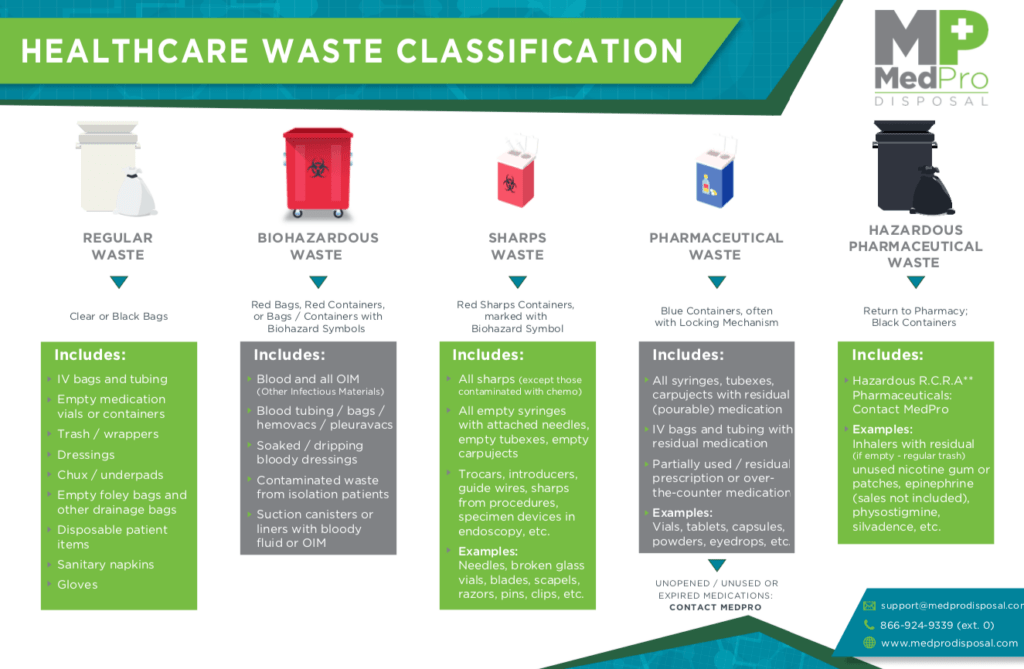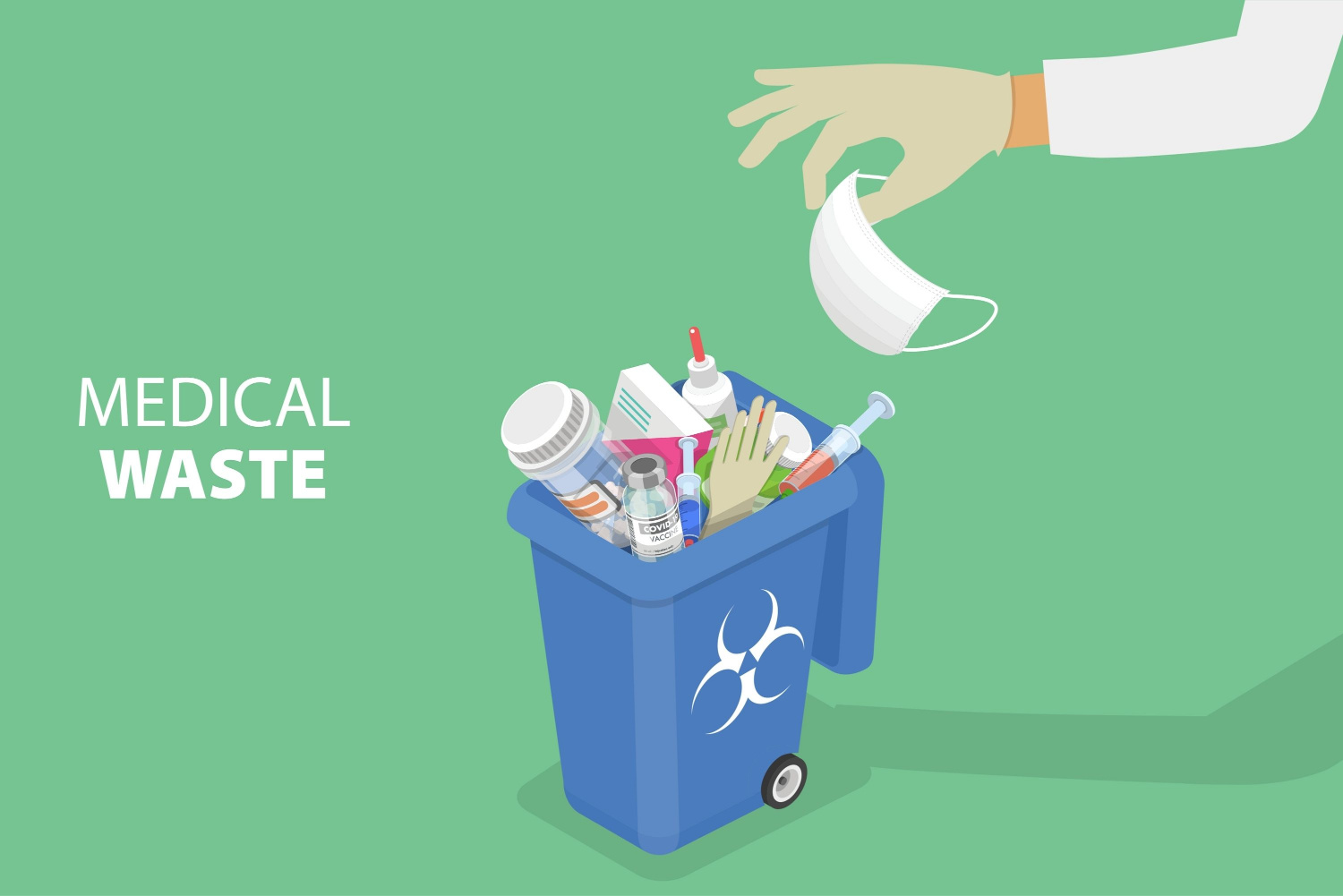Eco-Friendly Solutions for Medical Waste Removal: Prioritizing Safety and Conformity
Wiki Article
Making Sure Safe Handling and Disposal of Medical Waste
Making sure risk-free handling and disposal of medical waste is of vital importance in healthcare settings. Inappropriate administration of medical waste can posture considerable threats to the environment, public health, and health care employees. This requires adherence to rigorous guidelines and methods for its secure handling and disposal. In this introduction, we will certainly explore the importance of appropriate medical waste monitoring, the dangers related to improper handling and disposal, as well as the guidelines and approaches that can be carried out to guarantee its safe disposal. Additionally, we will certainly talk about the significance of training and education for healthcare experts in order to keep a risk-free and tidy medical care setting. By adhering to these techniques, we can successfully mitigate the prospective dangers connected with clinical waste.Significance of Appropriate Medical Waste Management
Appropriate clinical waste management is of utmost importance in ensuring the safety and wellness of healthcare experts, patients, and the public. Clinical waste describes any waste generated by health care centers during the diagnosis, therapy, or booster shot of people or animals. This waste can present major health and wellness risks otherwise taken care of and dealt with properly.
One of the primary reasons that correct clinical waste management is vital is to prevent the spread of contagious illness. Clinical waste, such as made use of needles, polluted dressings, and organic materials, can bring harmful pathogens. Otherwise dealt with and gotten rid of correctly, these microorganisms can be sent to medical care employees, clients, waste trainers, and even the public, causing the prospective outbreak of conditions.
In addition, appropriate clinical waste administration helps shield the setting - medical waste removal service. Medical waste has unsafe materials, including chemicals, pharmaceuticals, and radioactive compounds. When not managed appropriately, these compounds can pollute soil, water bodies, and the air, presenting a considerable threat to ecosystems and public wellness
In addition, reliable medical waste management guarantees compliance with local regulations and international standards. Governments and regulative bodies have developed procedures and guidelines to guarantee the safe handling, storage space, transport, and disposal of medical waste. Following these laws is vital to avoid lawful consequences and maintain the credibility and reputation of health care centers.
Risks of Improper Handling and Disposal

Patients can also be exposed to these transmittable diseases if medical waste is not appropriately gotten rid of. If polluted needles or other sharps are not disposed of in designated puncture-proof containers, they may unintentionally prick patients, leading to potential infections. If medical waste is not set apart appropriately, there is a danger of cross-contamination between different kinds of waste, additional boosting the possibilities of illness transmission.
Improper disposal of clinical waste can likewise have destructive results on the atmosphere and the public. If clinical waste is not treated and taken care of correctly, it can pollute water resources, dirt, and air, bring about the spread of pollutants and conditions. This can have long-lasting effects on ecosystems and public wellness.
Guidelines for Safe Handling of Medical Waste
Implementing reliable procedures for the safe handling of clinical waste is necessary in making sure the protection of medical care professionals, people, and the general public. These guidelines are essential in decreasing the threats connected with the handling and disposal of clinical waste, such as infections, injuries, and ecological pollution.First and leading, health care centers should develop a comprehensive waste management strategy that sticks to regional, nationwide, and international policies. This plan ought to consist of clear guidelines on waste partition, packaging, storage, labeling, and transport. It is vital to divide different kinds of waste, such as sharps, contagious materials, pharmaceuticals, and non-hazardous waste, to avoid cross-contamination and advertise safe disposal.
Furthermore, medical care employees should obtain comprehensive training on proper waste handling methods. They should be informed on the prospective hazards of clinical waste, the appropriate usage of personal protective equipment (PPE), and the correct procedures for handling, delivering, and throwing away different kinds of waste.
Additionally, health care facilities need to on a regular basis monitor and examine their waste management techniques to guarantee conformity with standards. This consists of performing routine inspections, reviewing waste handling treatments, and giving feedback and training to employee.
Effective Methods for Waste Disposal
To make certain the risk-free handling and disposal of medical waste, it is necessary to employ efficient approaches for garbage disposal. Clinical waste can present significant threats to public health and the environment if not dealt with and taken care of properly. Health care facilities and waste monitoring organizations have to carry out appropriate techniques to minimize these risks.One reliable strategy for garbage disposal is segregation. It entails separating various kinds of clinical waste based upon their characteristics. Segregation enables the proper treatment and disposal of each waste category, minimizing the capacity for contamination or injury. Health care facilities must give clear standards and training to personnel on just how to segregate waste appropriately.

Moreover, health care centers must collaborate with licensed waste monitoring business to ensure appropriate disposal of clinical waste. These companies have the experience and tools called for to securely dispose and deal with of clinical waste in conformity with regulations and finest methods.
Training and Education for Healthcare Professionals
Health care specialists play a critical role in making sure the risk-free handling and disposal of clinical waste via official site extensive training and education and learning. It is essential for healthcare suppliers to have a deep understanding of the potential dangers linked with clinical waste and the correct protocols for its management. By obtaining appropriate training, healthcare experts can lessen the prospective transmission of transmittable diseases, prevent ecological contamination, and shield both themselves and the public.
Furthermore, training programs must emphasize the usage of personal protective tools (PPE) and proper hand hygiene methods when dealing with medical waste. medical waste disposal service. Medical care professionals must understand just how to properly get rid of and utilize of PPE to shield themselves from potential direct exposure to dangerous products. They need to also be informed on the value of regular handwashing and the appropriate usage of hand sanitizers to minimize the spread of infectious illness
Continuing education and learning and regular updates on medical waste monitoring practices are important for healthcare specialists. As standards and regulations progress, it is important to keep medical care service providers educated concerning any type of adjustments in protocols and ideal techniques. This will certainly guarantee that they stay updated and maintain a high standard of security in getting rid of and taking care of of medical waste.
Final Thought
In final thought, proper handling and disposal of clinical waste is vital to make certain the safety and security of health care professionals, patients, and the setting. By adhering to these practices, we can mitigate the possible risks associated with clinical waste.Medical waste refers to any waste generated by medical care facilities during the medical diagnosis, treatment, or booster shot of animals or human beings. If medical waste is not set apart appropriately, there is a risk of cross-contamination between various types of waste, further boosting the chances of condition transmission.
It is crucial to divide various types of waste, such as sharps, transmittable materials, drugs, and non-hazardous waste, to avoid cross-contamination and advertise risk-free disposal. WasteX Medical Waste Disposal.
To ensure the risk-free handling and disposal of medical waste, it is important to use efficient approaches for waste disposal. Additionally, health care centers should establish a normal waste collection and transportation routine to stop waste buildup and reduce the threat of mishaps or contamination.
Report this wiki page